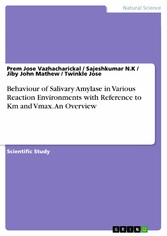Suchen und Finden
Behaviour of Salivary Amylase in Various Reaction Environments with Reference to Km and Vmax. An Overview
Mehr zum Inhalt

Behaviour of Salivary Amylase in Various Reaction Environments with Reference to Km and Vmax. An Overview
Scientific Study from the year 2016 in the subject Chemistry - Bio-chemistry, grade: 1.5, Mar Augusthinose College, language: English, abstract: Amylase is an enzyme which catalyzes the hydrolysis of ? (1, 4)-glycosidic linkages in amylose (a linear form of starch), amylopectin (a branched form of starch) and glycogen into simpler carbohydrate molecules such as oligosaccharides or disaccharides. Alpha-amylase is the major form of amylase found in human, most prominently in pancreatic juice and saliva. The salivary amylase is an amylolytic enzyme, which can acts on cooked or boiled starch and converts it in to maltose. So it became interesting to study the behaviour of salivary amylase, when it is secreted as result of different stimuli. And thus began to study the effect of five different stimulatory temperatures, and also the effect of four tastes on the behaviour of salivary amylase. For the study of stimulatory effect of temperature on salivary amylase, five different temperatures are selected (4, 27, 37, 55 and 75°C). And likewise four tastes also selected (sweet, sour, salt and bitter). The DNS method was done in the both tests to obtain the absorbance at 520 nm. The samples were collected from three people, of same age. The saliva was collected at same time, after one and a half hour of their breakfast in order to maintain a controlled condition for this study. In each cases the incubation temperature also kept as variable (4, 27, 37, 55 and 75°C). This study was also aimed to determine the behaviour of salivary amylase with reference to the kinetic parameters like Km and Vmax of salivary alpha amylase by incubating the enzyme (stimulated by different stimulatory conditions of temperature and taste) with varying concentration of substrate. The study revealed the consistency in kinetic parameters like Km and Vmax of salivary alpha amylase secreted in response to various stimuli.
Dr. Prem Jose Vazhacharickal is currently working as an assistant professor in the Department of Biotechnology, Mar Augusthinose College, Ramapuram, Kerala, India. He received the research training and academic guidance from Prof. Dr. Andreas Buerkert, University of Kassel, Germany.
Alle Preise verstehen sich inklusive der gesetzlichen MwSt.






